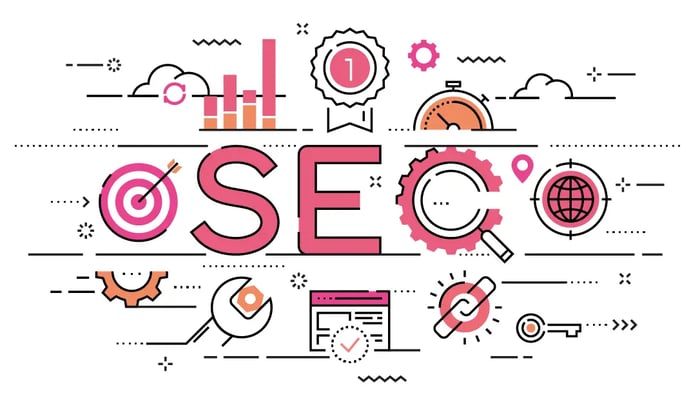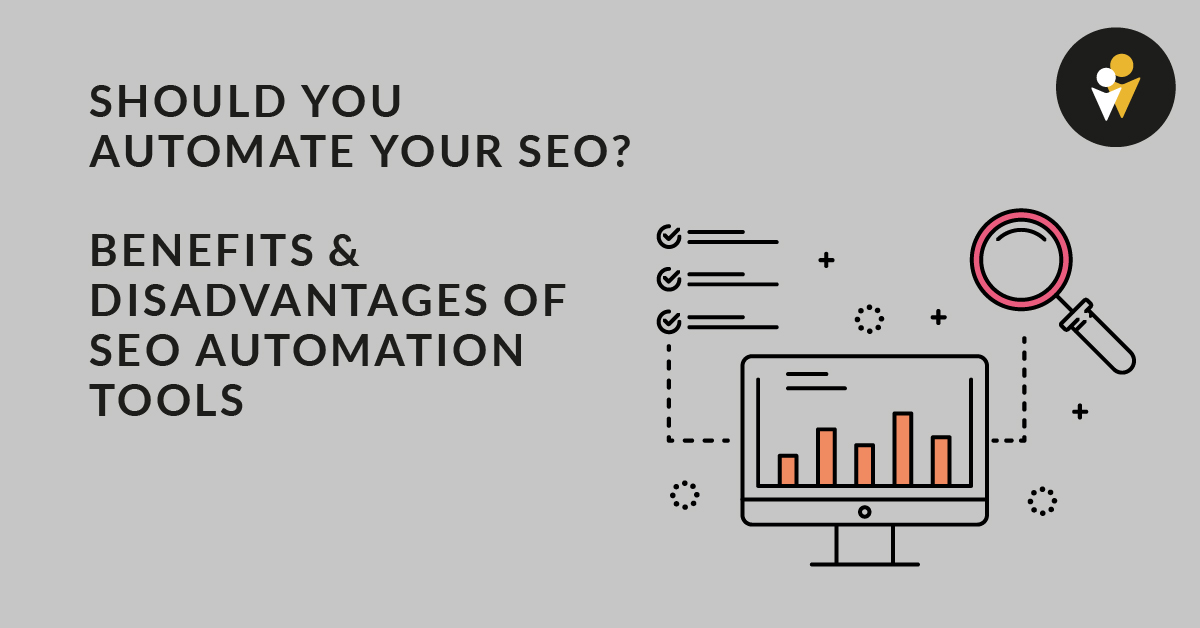As an SEO specialist, marketer, or business owner, you know how crucial SEO is to your online success. But with so many tasks to manage and so little time, you may find yourself wondering if there's a better way to handle your SEO campaigns.
That's where SEO automation tools come in–but are they right for you?
SEO automation tools are designed to automate various aspects of your SEO campaigns, from keyword research to website optimizations. They can save time, increase productivity, and provide valuable insights into your website's SEO performance. However, they're not a one-size-fits-all solution, and they come with their own set of limitations and drawbacks.
So, should you automate your SEO?
This blog post will:
- take a closer look at what SEO automation is and why it's used,
- explore the benefits and disadvantages of using SEO automation tools,
- provide examples of automated SEO tasks, and
- share my favorite SEO automation tools.
By the end of this guide, you'll have a better understanding of whether or not SEO automation tools are right for you and your SEO campaigns. If you're ready to explore the world of SEO automation and find out if it's the right fit for your needs, keep reading!

What is SEO Automation?
SEO automation refers to the use of software or tools to automate certain tasks in the search engine optimization process.
Marketers use SEO automation tools every day to streamline and optimize tasks like keyword research, on-page optimization, link building, and reporting, making the entire process faster and more accurate.
By taking care of tedious, repetitive tasks, automation tools give SEO professionals more time to focus on the bigger picture and strategic decision-making. Plus, automation can provide valuable data and insights that help improve website performance and drive better results.
It's crucial to remember, however, that SEO automation tools are not a one-size-fits-all solution, and human expertise is still required to develop effective strategies. Think of it like a dynamic duo–automation tools and SEO experts working together to save the day (and your website).

Benefits of SEO Automation Tools
As I mentioned in the previous section, SEO automation tools are designed to automate various SEO tasks and can help you manage your campaigns more efficiently. But what specific benefits do these tools offer?
Let's take a closer look.
First, it's important to note that people use SEO automation tools for a variety of reasons. Some may be looking to save time and increase productivity, while others may want to gain deeper insights into their website's SEO performance. Whatever the reason, SEO automation tools can provide a range of benefits, including:
- Increased efficiency: By automating routine and foundational SEO tasks such as keyword research, site audits, and content optimization, you can free up more time to focus on higher-level strategic tasks that require your human creativity and intelligence.
- Improved accuracy: SEO automation tools can help reduce human error by streamlining processes and automating repetitive tasks.
- Greater scalability: As your website and SEO campaigns grow, it can be difficult to manage everything manually. Automation tools can help you scale your efforts without sacrificing quality.
- Valuable insights: Many SEO automation tools offer detailed analytics and reporting features that can help you identify areas for improvement and track your progress over time.
So, whether you're a small business owner or a marketing professional, SEO automation tools can provide a range of benefits to help you achieve your goals.
Let’s dig a little deeper into the benefits of using these tools.
Save Time & Effort
One of the most significant benefits of using SEO automation tools is the time and effort they can save you. Here’s how:
- Automating routine tasks: Tasks such as keyword research, site audits, and content optimization can be time-consuming when done manually. SEO automation tools can help you automate these processes.
- Reducing human error: When working on SEO campaigns, it's easy to make mistakes that can impact your results. Automating repetitive tasks reduces the risk of human error and ensures more accurate results.
- Streamlining processes: SEO automation tools can help you streamline your workflows and make your campaigns more efficient.
Increase Productivity & Efficiency
Another major benefit of using SEO automation tools is the increased productivity and efficiency they can provide. By automating tasks that would otherwise require significant time and effort, businesses can achieve more in less time.
Two examples of how these tools can increase productivity and efficiency are by allowing you to manage multiple SEO projects and by improving collaboration.
With automation, you can track and analyze data from multiple projects simultaneously, allowing you to make informed decisions and adjust your strategies as needed.
Many SEO automation tools offer collaboration features that can help teams work together more efficiently. By streamlining workflows and providing clear communication channels, you can improve productivity and reduce the risk of miscommunication.
Streamlining Large-Scale SEO Campaigns
If you run complex and large-scale SEO campaigns, automation tools can be invaluable resources. They allow you to manage and track data with ease.
SEO automation tools help with SEO campaigns by:
- Identifying optimization opportunities: Automation tools can scan websites and identify technical issues or optimization opportunities that may have gone unnoticed, thus allowing marketers to prioritize their efforts.
- Tracking performance: With SEO automation tools, you can track performance metrics such as rankings, traffic, and performance for separate initiatives, helping you stay on top of all of your campaigns’ progress.
- Reporting: Generating reports is a time-consuming task, particularly with large-scale campaigns. Automation tools can automatically compile reports, making it easier for marketers to share campaign data with their team, stakeholders, or clients.
Accurate Data Analysis & Reporting
Data is the backbone of successful SEO campaigns. But let's face it, accurate data analysis and reporting can be daunting, especially if you have limited resources. That's where SEO automation tools come in, offering benefits like:
- Precise data collection: SEO automation tools can collect data from various sources and provide in-depth analysis without errors or oversights. This can help businesses make informed decisions about their campaigns and improve overall performance.
- Customizable reporting: Automation tools allow marketers to customize reports based on specific requirements and performance indicators, providing a clear understanding of the data.
While automation tools can streamline data analysis and reporting, it is important to keep in mind that they are only as accurate as the data they are fed. If you are using an SEO tool, you should verify data accuracy and ensure that the campaigns are still in line with your overall goals.
Detecting & Fixing Technical Issues
Technical issues on a website can negatively impact SEO performance, leading to lower rankings and traffic. Identifying and fixing these issues can be time-consuming and challenging, especially if you are without a dedicated SEO team.
Here are some ways in which SEO automation tools can help:
- Crawling and analysis: SEO automation tools can crawl a website and identify technical issues like broken links, missing tags, and slow-loading pages. This information can then be used to prioritize and fix issues.
- On-page optimization: Automation tools can help optimize individual pages by analyzing content, meta tags, and other on-page factors. This can help ensure that the website is optimized for search engines and user experience.
- Site audits: Automation tools can conduct site audits to identify issues such as duplicate content, missing alt tags, and other technical issues that could impact SEO performance.
Better Keyword Research & Analysis
Not only is keyword research an essential aspect of SEO, it's the foundation of all marketing campaigns! It's how you find out what your heroes (ideal customers) are searching for, what words resonate with them, and how you can optimize your content to rank in the search results.
Fortunately, SEO automation tools can help you make this process much smoother and more efficient. Here are just a few ways these tools can aid your keyword research:
- Keyword discovery and analysis: Automation tools can suggest new keywords and provide insight based on search volume, competition, user intent, and relevance to a business's industry and target audience. This can help with identifying new opportunities to expand your reach.
- Competitor analysis: Automation tools can also help analyze the keyword strategies of their competitors, including which keywords they're targeting and how they're ranking. The information can be used to identify gaps and opportunities in your current keyword strategy.
Enhancing Overall SEO Strategy
SEO is a dynamic and ever-changing field, and you must try to stay one step ahead of the competition with an effective strategy in place. Thankfully, automation tools can help you develop and implement such a strategy. Check out a few ways automation can elevate your overall SEO game:
- Data analysis: Automation tools can provide businesses with precise and accurate data analysis, such as keyword performance, backlink analysis, and website traffic. This data can be used to make informed decisions on which SEO tactics to focus on and adjust the strategy accordingly.
- Better organization: Automation tools can help you better organize your SEO efforts by tracking keywords, analyzing website performance, and monitoring backlinks. This can lead to a more effective and efficient overall strategy.
While we can see there are many benefits to using SEO automation tools, there are also limitations that need to be considered.

Limitations of SEO Automation Tools
Although SEO automation tools can offer several advantages, it's important to keep in mind that they may also have some drawbacks. Here are some potential limitations to consider when deciding whether to rely on SEO automation tools for your business:
- Limited creativity: SEO automation tools are designed to handle repetitive tasks and provide data analysis, but they lack the creativity and nuance that a human can bring to the table. This can lead to a lack of originality and homogenization of content, which can ultimately harm a business's SEO efforts.
- Overreliance: Becoming too reliant on automation tools can lead to over-optimizations, a lack of critical thinking, and an inability to adapt to changing SEO trends and algorithms.
- Inaccurate data: While automation tools can provide precise data analysis, they are not infallible. They can make mistakes and misinterpret data, leading to inaccurate reporting and flawed decision-making.
- Cost: Many SEO automation tools can be expensive, especially for small businesses or those on a tight budget. It's important to consider the cost-benefit analysis of investing in such tools and whether they are truly necessary for your SEO efforts.
While these limitations do not necessarily outweigh the benefits of SEO automation tools, it's important to consider them when making decisions about incorporating automation tools into your overall SEO strategy.
Let’s take a closer look.
Can't Replace Human Intelligence & Creativity
SEO automation tools can certainly help businesses save time and streamline their processes, but they shouldn't be viewed as a replacement for human expertise. There are certain areas where an SEO specialist's knowledge and creativity simply can't be replicated by a tool:
- Understanding context: SEO automation tools rely on algorithms and data analysis to make decisions about SEO strategy, but they may not fully understand the nuances of a business's industry or audience. This can lead to decisions that do not align with your own goals or values.
- Personalization: Human beings are better equipped to personalize content and messaging for specific audiences. While automation tools can make recommendations for keyword targeting and content topics, they may not be able to craft messaging that resonates with your audience.
- Adaptability: SEO algorithms and trends are constantly evolving, and automation tools may not be able to keep up with the latest changes. Human beings are better equipped to adapt to new trends and make decisions on the fly.
- Creativity: While automation tools can generate content and provide suggestions for topics, they lack the creativity and originality that human beings can bring to content creation. Human beings are better able to generate unique ideas and create content that stands out from the competition.
May Lead to Over-Optimization & Penalties
SEO automation tools can be a double-edged sword, as they can occasionally lead to over-optimization that may end up hurting your search engine rankings. This can happen by relying too heavily on automation in your SEO strategy.
- Keyword stuffing: Automation tools may recommend using certain keywords in content and meta tags, but overusing these keywords can lead to keyword stuffing. Search engines can penalize websites that engage in keyword stuffing, as it is considered spammy and can be seen as an attempt to manipulate search rankings.
- Low-quality links: Some automation tools may recommend building links through questionable or spammy methods, which can lead to penalties from search engines.
May Provide Inaccurate Data & Analysis
As powerful as SEO automation tools can be, they can sometimes provide inaccurate data and analysis. The tools are designed to provide insights into website performance, but it's essential to keep in mind that they are not infallible.
- Data collection errors: Automation tools rely on data from various sources, such as search engines and web analytics platforms, as well as their own databases and algorithms. However, errors can occur during data collection, such as when search engines update their algorithms or when tracking codes are not properly implemented on a website.
- Proprietary metrics: Many SEO tools also have their own metrics that measure various things, such as a keyword’s difficulty, a website's authority, or a backlink profile. Because the metrics are not official Google metrics, relying on them can steer you down the wrong path.
Can Be Expensive & May Require Technical Expertise
Automating SEO tasks can be a double-edged sword. While it can save time and increase productivity, it can also be costly. Some SEO automation tools are expensive, making it challenging for small marketing teams with limited resources to invest in them.
Additionally, these tools often require technical expertise to use effectively, which can be a barrier for smaller businesses or those without a dedicated SEO team. Companies may need to hire specialized staff to operate and manage these tools, adding to the overall cost.
As you can see, SEO automation tools have benefits, they also have their drawbacks, which means they aren’t a perfect fit for all businesses or every scenario.

What SEO Tasks Can Be Automated?
Automating certain SEO tasks can significantly increase productivity and efficiency, freeing up valuable time for higher-level strategy and decision-making. That said, not all SEO tasks are suitable for automation. In general, tasks that are repetitive, data-driven, and require little human intuition or creativity are the best candidates for automation.
Here are some examples of SEO tasks that can be effectively automated, including those for which our company, PIC, leverages SEO automation:
Website Monitoring
Website monitoring is a crucial task that ensures a website is performing optimally. However, manually monitoring a website can be time-consuming and prone to errors. By using automated website monitoring tools, you can quickly identify any errors, warnings, or other issues and promptly fix them before they negatively impact SEO performance.
Keyword Research
Keyword research is a critical aspect of SEO and digital marketing, but it can be a tedious and time-consuming task. Automated keyword research tools can analyze search trends, suggest new keywords, and provide insights into keyword performance, making it easier for you to optimize website content and improve search rankings.
SEO outlines
Creating an SEO outline can be a time-consuming task, but it is essential for ensuring that all on-page SEO elements are optimized. With the help of AI-powered tools like ChatGPT, you can quickly generate SEO outlines that include relevant keywords, meta tags, and other important on-page elements, saving valuable time while still ensuring high-quality SEO.
Tracking Rankings & Search Features
Manually tracking search rankings and search features for a website can be a daunting task. Automated rank tracking tools can provide daily data on keyword rankings, SERP features, and other key metrics, enabling businesses to identify areas for improvement and adjust their SEO strategy accordingly.
Backlink Analysis
Backlink analysis is a crucial task for understanding a website's link profile and identifying opportunities for link building. Automated backlink analysis tools can quickly analyze a website's backlinks, identify toxic links, and suggest link-building opportunities, making it easier for businesses to improve their link profile and boost their search rankings.
Competitor Analysis
Competitor analysis is an essential part of any SEO strategy, but manually analyzing a competitor's keywords and backlinks can be time-consuming. Automated competitor analysis tools can quickly identify keyword and backlink gaps between your website and your competitors, enabling you to adjust your SEO strategy and stay ahead of the competition.

How PIC Uses Tools to Automate SEO Tasks
When it comes to SEO automation tools, there are plenty of options available, but not all tools are created equal. I’ve tested and used a variety of SEO automation tools and have identified my favorites that I use every day for PIC clients.
To make the most of SEO automation tools, I recommend following some best practices.
- First, it's important to understand what tasks can be automated and which ones require human input.
- Second, it's essential to keep a close eye on the accuracy of the automated results and be ready to make manual adjustments when necessary.

Semrush is a popular all-in-one SEO tool that offers a range of features, such as keyword research, site audits, backlink analysis, and more. At PIC, we don’t only use Semrush for keyword research and competitive analysis. It hosts our clients’ SEO Dashboards that provide a quick overview of website health, rankings, backlink analysis, and more.

ScreamingFrog is a web crawler tool that allows us to crawl websites to find technical issues and optimize for search engines. We use ScreamingFrog to identify broken links and 404 pages, analyze page titles and meta descriptions, and find duplicate content.
Two ScreamingFrog benefits are its speed and scalability. It can crawl even large websites quickly, making it a valuable tool for managing large-scale SEO campaigns.
ChatGPT is a natural language processing (NLP) tool that uses AI to generate content and answer questions. I’ve found ChatGPT to be a valuable tool for creating SEO outlines and generating content ideas.
Using ChatGPT, I can quickly generate outlines for blog posts, landing pages, and other types of content. I also use ChatGPT to come up with new content ideas based on our target keywords or topics and to rewrite the content into certain tones.
Overall, these SEO automation tools help our SEO team work more efficiently and effectively, allowing us to focus on higher-level strategy and creative tasks that require human input.
Looking for Additional SEO Guidance?
If you have follow-up questions or would like additional assistance with your SEO program, PIC is happy to help.


